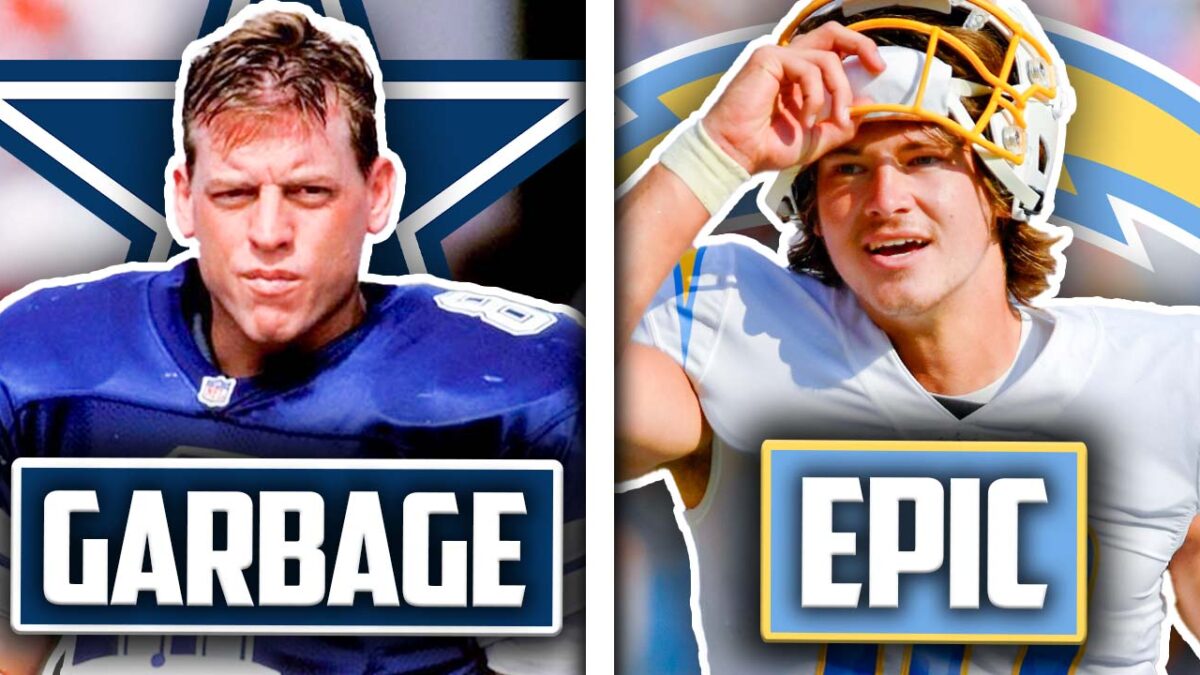
They say first impressions matter in life. Well when it comes to being an NFL quarterback, it’s not always true.
Some NFL QBs starred right off the bat in their rookie years and continued that strong play. The ones that started out bad? Some of them turned out just fine, and others never figured it out.
Here are the five best rookie quarterback seasons in NFL history…and the five worst.
Best: Justin Herbert (2020)
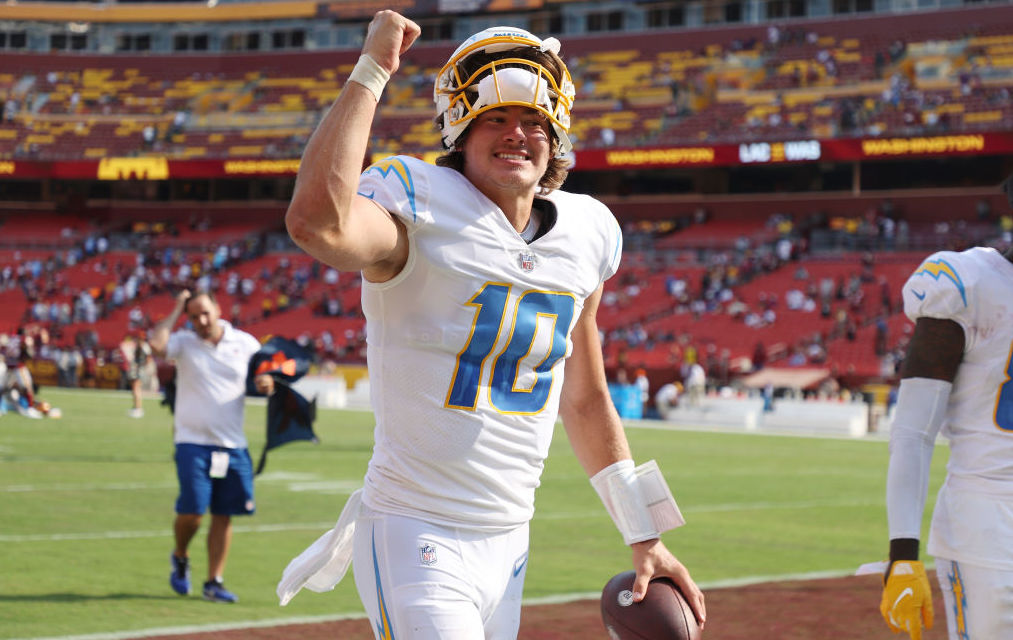
The Los Angeles Chargers drafted Herbert sixth overall in 2020. He was the third QB taken in that class, behind Joe Burrow and Tua Tagovailoa who went first and fifth to the Cincinnati Bengals and Miami Dolphins, respectively.
Many scouts thought Herbert would benefit from sitting for a full year, but he was forced to start in the team’s Week 2 game against the Kansas City Chiefs, as starter Tyrod Taylor suffered a punctured lung just before kickoff.
As it turned out, Herbert was more than ready for the big stage. He played excellent football the entire way and never lost the starting job, setting a handful of impressive records along the way.
Click on ‘Follow Us’ and get notified of the most viral NFL stories via Google! Follow Us
Herbert’s 31 touchdown passes, 36 total TDs, 396 completions and eight 300-yard total games all set rookie QB records. He also engineered three quarterback game-winning drives en route to Offensive Rookie of the Year honors.
Herbert also finished with 4,336 passing yards, falling just short of the record Andrew Luck set in 2012 with 4,374. Herbert, of course, would’ve broken that if he had started in Week 1 as well.
But anyway, it was only the best statistical rookie QB season ever.
Worst: John Elway (1983)
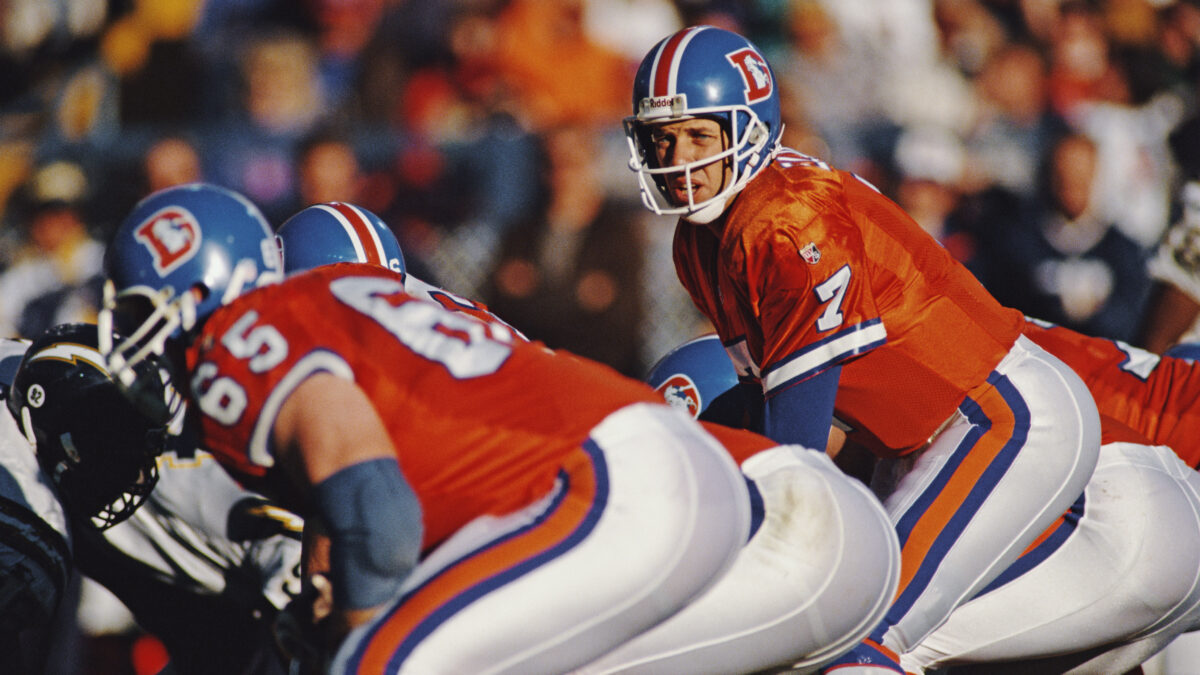
The two-time Super Bowl champion and Hall of Famer is a prime example of how you can’t judge a career based on a rookie season. Even the best of the best need time to put it all together.
Elway was selected first overall by the Baltimore Colts in the 1983 Draft, but he had no desire to play for the franchise and demanded a trade. The Colts traded him to the Denver Broncos in a blockbuster deal, and the rest is history.
Elway, however, had a miserable first season in the pros. He went 4-and-6 as a starter, which doesn’t seem so bad. But the stat line was ugly: A woeful 47.5 completion percentage for 1,663 yards, seven touchdowns and 14 interceptions.
Elway was also sacked 28 times in those games. He was actually dropped on a ridiculous 9.8 percent of his attempted pass plays. Furthermore, he fumbled six times and posted a 54.9 quarterback rating, which was of course the lowest mark of his career.
But we don’t really have to sit here and tell you how Elway turned out following the rough first year, do we? Didn’t we mention something about two Super Bowl rings and a spot in the Hall?
Best: Dak Prescott (2016)
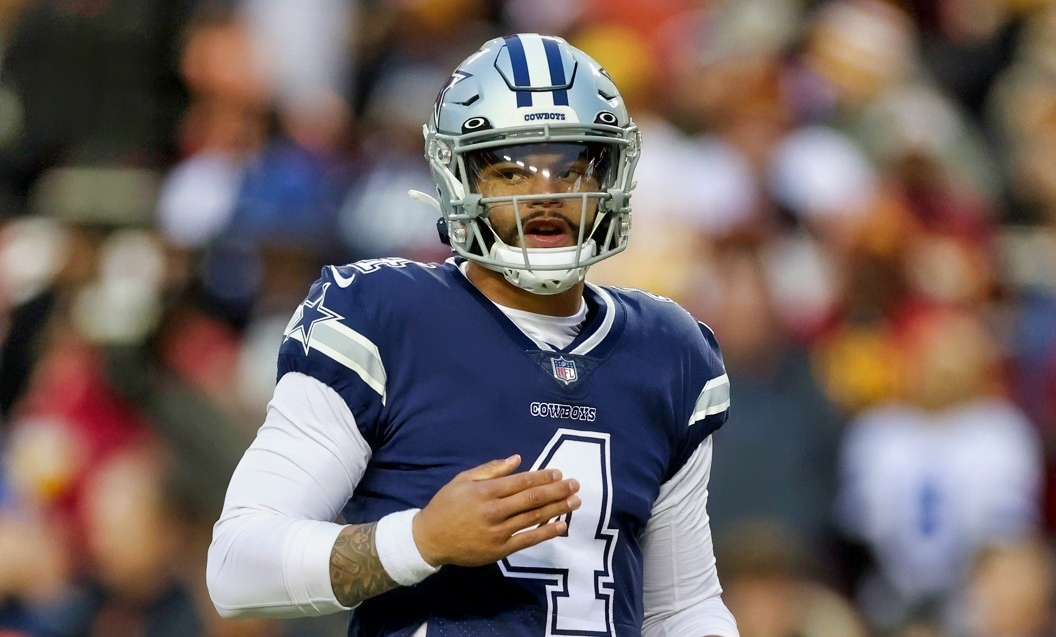
The Cowboys drafted the Mississippi State QB in the fourth round – 135th overall – in 2016. They merely expected Prescott to back up Tony Romo, until the latter suffered a back injury in preseason play that sidelined him indefinitely.
Jason Garrett had no choice but to start Prescott, but the then-23-year-old was more than up for the challenge.
Prescott and fellow rookie Ezekiel Elliott took the Dallas offense to new heights. The first-year QB completed 67.8 percent of his passes for 3,667 yards and 23 touchdowns against only four interceptions. Prescott was also a force on the ground, with 282 rushing yards and six rushing TDS.
That was enough to help Dallas claim the NFC East division title and the conference’s top seed with a 13-3 record. Prescott had more than defined expectations, and as Romo got closer to a return, he professionally stated that Prescott had earned the starting job.
The 13 wins marked Dallas’ best regular season performance in seven years, and Prescott went on to win Offensive Rookie of the Year honors. However, their dream season ended at the hands of Aaron Rodgers and the Green Bay Packers, with No. 12 barely out-dueling Prescott’s Cowboys in a thrilling Divisional Round affair.
The season wasn’t all for naught, however. Dallas had their new franchise QB in place, and they proceeded to release Romo, who ultimately retired. Prescott has only gotten better over time, making a strong case as a top-five quarterback in the game today.
Worst: Alex Smith (2005)
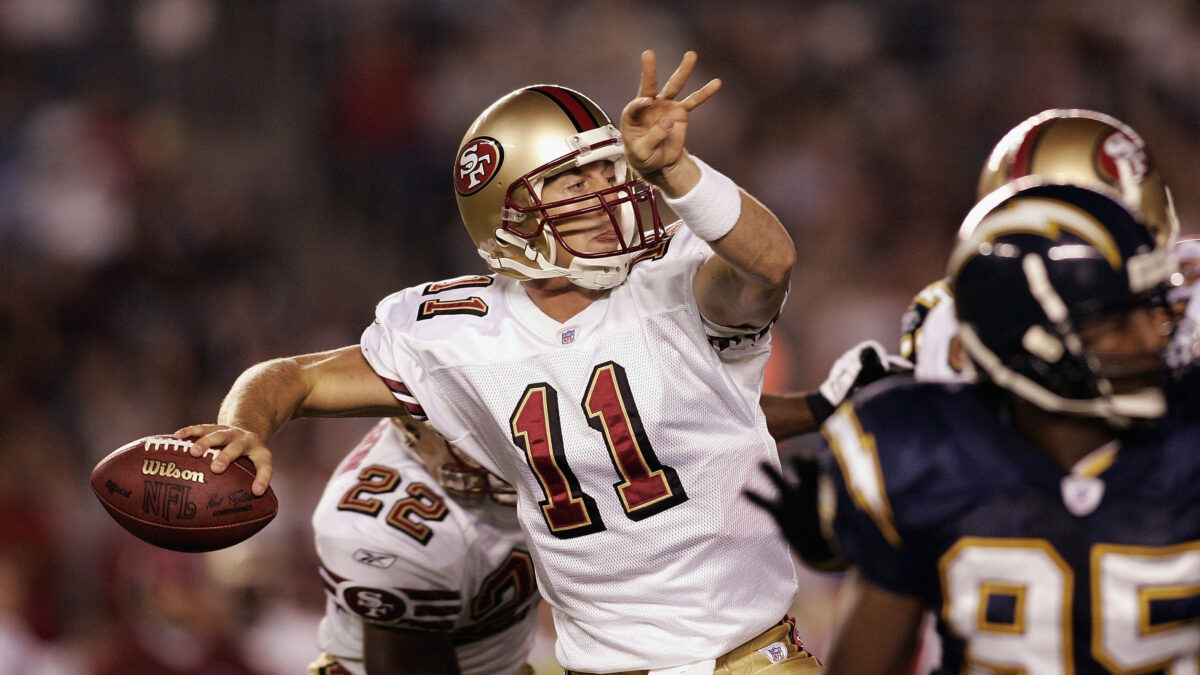
You can put a bit of an asterisk here if you’d like. Smith only started seven contests and had nine total game appearances. But when he was on the field, it was just tough to watch.
The San Francisco 49ers infamously took Smith over future Hall of Famer Aaron Rodgers with the top pick in 2005. While Rodgers had the fortunes of learning behind another icon Brett Favre for three years, Smith was put in a tough situation on a miserable San Fran team.
Smith lost five of his seven starts and barely completed over half his pass attempts – 50.9 to be exact. He had – wait for it – one passing touchdown against 11 interceptions in those games.
Smith averaged a putrid 97.2 passing yards per game and took 29 sacks. He also fumbled a whopping 11 times and finished the year with a terrible 40.8 quarterback rating.
But like Elway, this wasn’t a sign of what was to come for Smith. He turned his career around following the arrival of John Harbaugh in 2011, helping San Fran to an NFC Championship Game appearance that year.
A three-time Pro Bowler, Smith also pulled off the rare feat of taking three separate teams to the postseason: The 49ers, Kansas City Chiefs and Washington Football Team. And how he fought his way back into the game following a life-threatening leg fracture that required 17 surgeries is nothing short of mesmerizing and inspirational.
The rookie year was not a sign of what was to come for Smith, who carved out a very stellar career.
Best: Russell Wilson (2012)
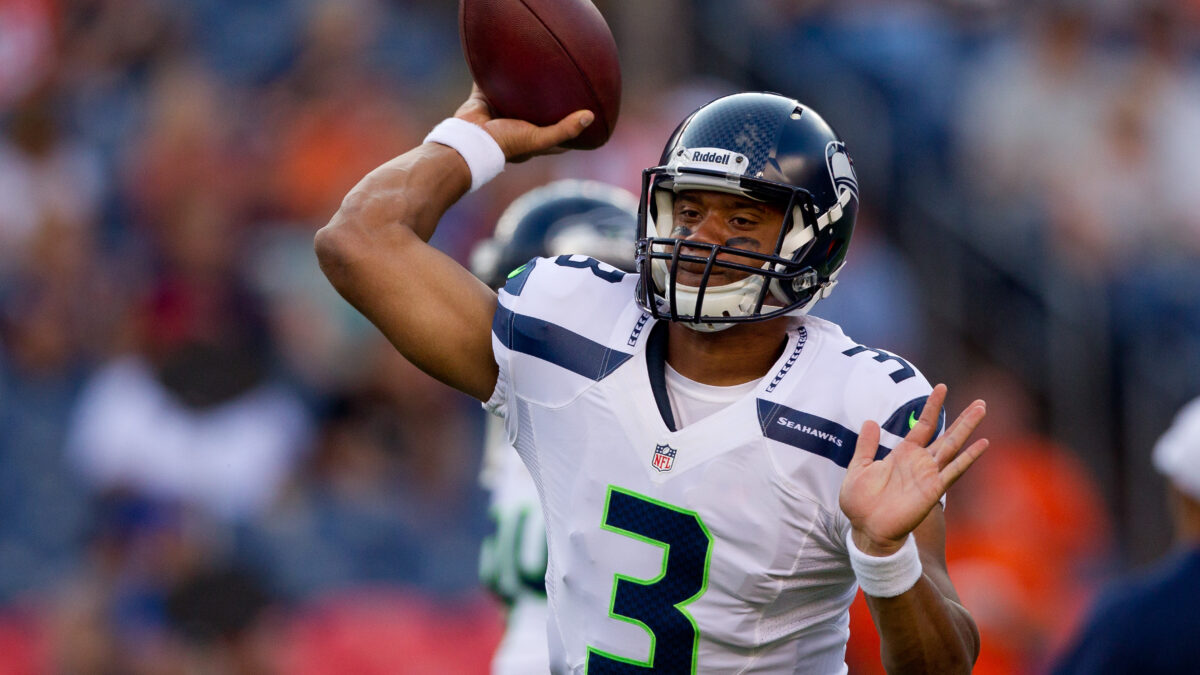
Wilson was only the sixth quarterback taken in what turned out to be a deep and all-time great quarterback class. But if there was a do-over, he’d most likely go first overall.
Wilson was taken in the third round – 75th overall – by the Seattle Seahawks. He had the talents and ceiling to be a first-round pick, but his 5-foot-11 height scared teams away.
Well, the Seahawks took a change on Dange-Russ and it worked out beautifully. He beat out offseason free agent signing Matt Flynn for the starting job and took a young Seahawks team to new heights.
Led by the Legion of Boom and power running back Marshawn Lynch, Wilson excelled in a game manager role as a rookie. He helped Seattle to an 11-and-5 record, which included defining wins over Tom Brady’s Patriots, Harbaugh’s 49ers and Aaron Rodgers’ Packers.
Wilson, who orchestrated four game-winning drives as a rookie, completed 64.1 percent of his passes for 3,118 yards and 26 touchdowns against 10 picks. He added 489 yards on the ground and four rushing touchdowns.
The Seahawks defeated Washington on the road in the Wild Card Round. They gave the top-seeded Atlanta Falcons a giant scare in the Divisional Round but fell via late Matt Bryant field goal.
Wilson and the Seahawks were just getting started, however. They returned with a force in 2013 and went on to claim the franchise’s first Super Bowl championship by dismantling Peyton Manning’s Broncos.
Worst: Jack Trudeau (1986)
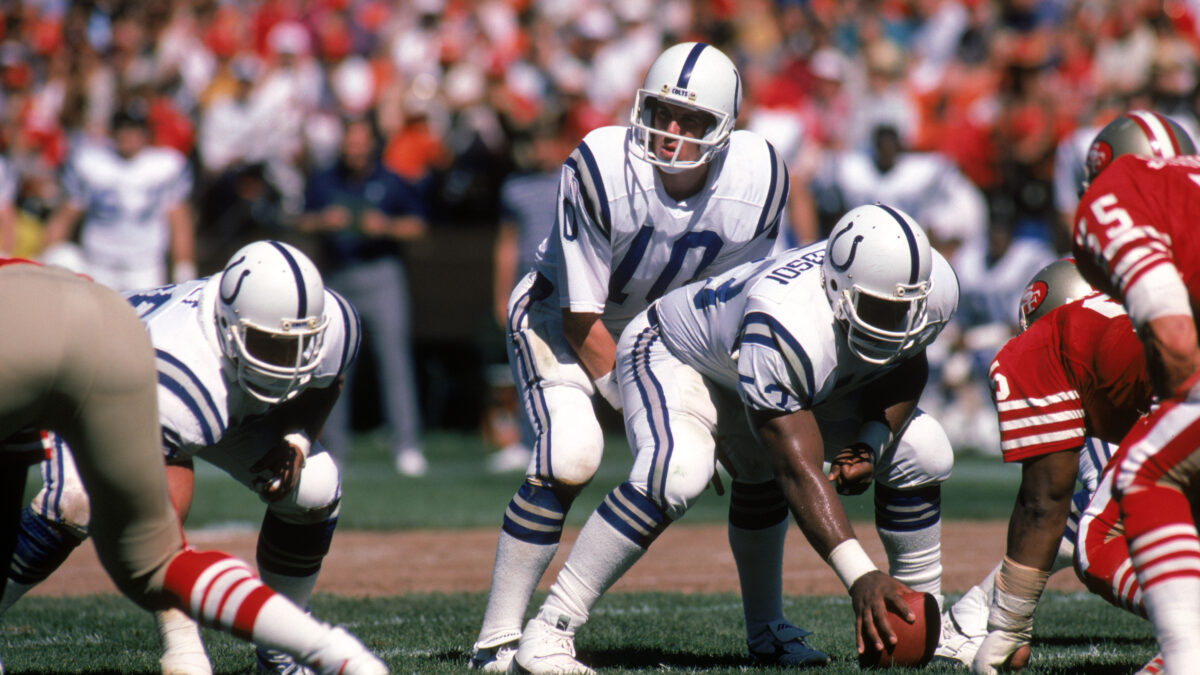
The Indianapolis Colts drafted the Illinois product with the No. 47 selection in 1986. This came after the failed Art Schlichter selection…and of course three years after the John Elway fiasco.
Unfortunately, Trudeau wasn’t the answer to the Colts’ long-term problems at quarterback. But you can only blame Trudeau so much, because the Colts were a laughingstock with eight straight losing seasons heading into the 1986 season.
But still, Trudeau’s play as a rookie was nothing short of a nightmare. He lost all 11 starts and completed 48.9 percent of his passes for 2,225 yards and only eight touchdowns against 18 interceptions.
Trudeau was sacked 29 times and led the league with 13 fumbles.
It was a disaster in every aspect for Trudeau, though he managed to turn things around and put together a decent career.
Trudeau went 5-and-3 as a starter in his sophomore year and led the Colts to a surprise playoff berth, though they ultimately fell to the Cleveland Browns in the Divisional Round.
Best: Cam Newton (2011)
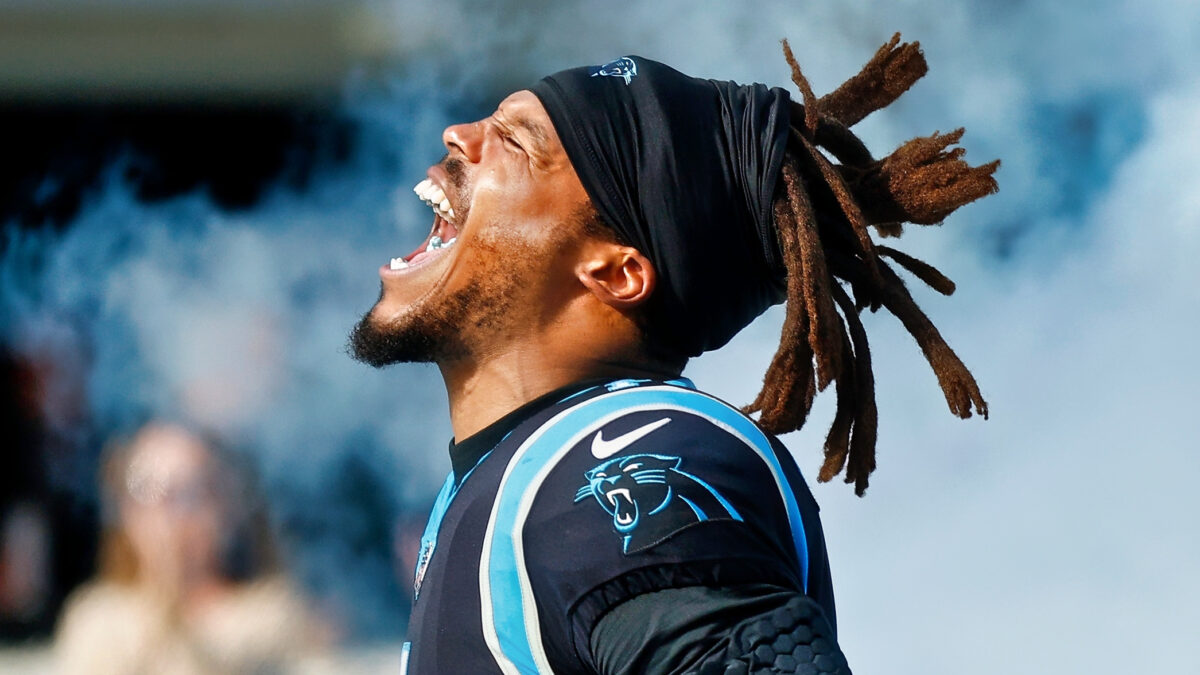
Newton wasn’t hyped as a generational talent by any means. He carried a boom-or-bust label, but the QB-needy Carolina Panthers drafted the Auburn star anyway with the top selection in 2011.
Well, it certainly didn’t take long for Newton to leave his mark on the NFL. In his first career game – against the Arizona Cardinals in Week 1 – Newton completed 24 passes for 422 yards, and three total touchdowns.
Newton led Carolina to a 6-and-10 record, an admirable improvement for a team that went 2-and-14 the year before. Newton won the Offensive Rookie of the Year award after tossing 4,051 passing yards and 21 TDS against 17 picks. And of course, he was a machine on the ground with 706 rushing yards and an insane 14 rushing TDs.
Newton, by the way, was the first rookie QB to hit 4,000 passing yards in a season. And as we all know, this was not a case of beginner’s luck for Super Cam. He led Carolina to four playoff appearances, highlighted by a trip to Super Bowl 50 in his 2015 league MVP season.
Worst: Troy Aikman (1989)
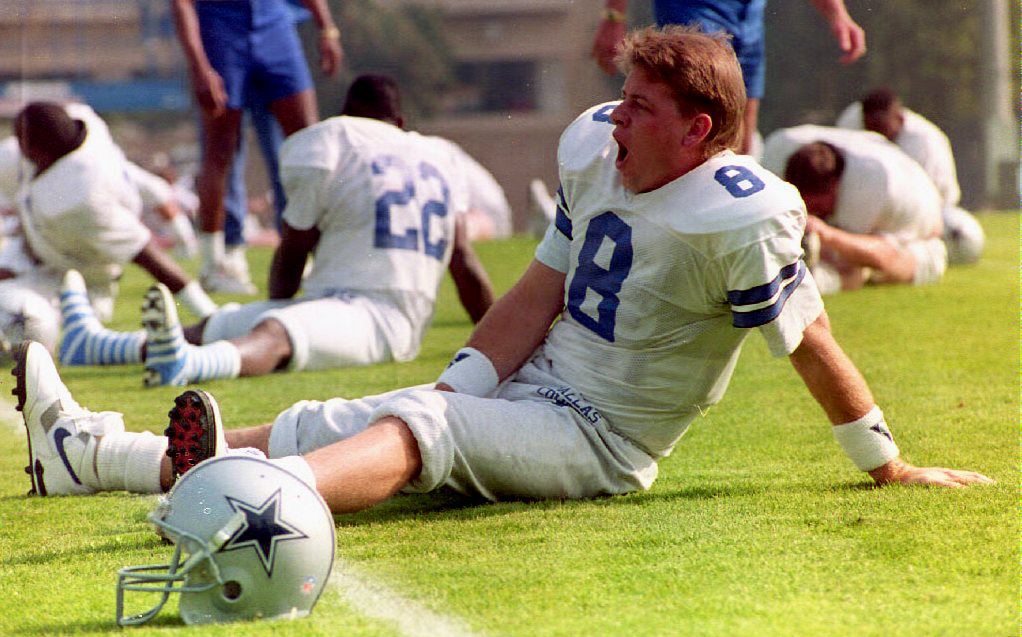
The Cowboys were in the midst of a rebuild when they drafted Aikman with the top selection in 1989. This also marked the first year of the Jerry Jones ownership, and the first season of the illustrious Jimmy Johnson era.
So Aikman and company surely knew that ‘89 would be a year of growing pains. Future cornerstones such as Emmitt Smith, Darren Woodson, Larry Allen, Russell Maryland and Kevin Smith weren’t in the NFL yet, after all.
Anywho, Aikman’s horrific rookie year was on par with that of Jack Trudeau. Like, almost the exact same.
Like Trudeau, Aikman made 11 starts and lost every single one of them. Like Trudeau, Aikman had 18 interceptions. The latter had just nine TD passes and recorded just 1,749 passing yards, and on top of that, he fumbled six times.
But again, brighter days were ahead. Armed with a ton of draft picks from the Herschel Walker trade, Johnson brought in several future stars to build up a future dynasty that would win three Super Bowls in the ‘90s.
So ya, we’d say everything worked out for Aikman in the very end.
Best: Ben Roethlisberger (2004)
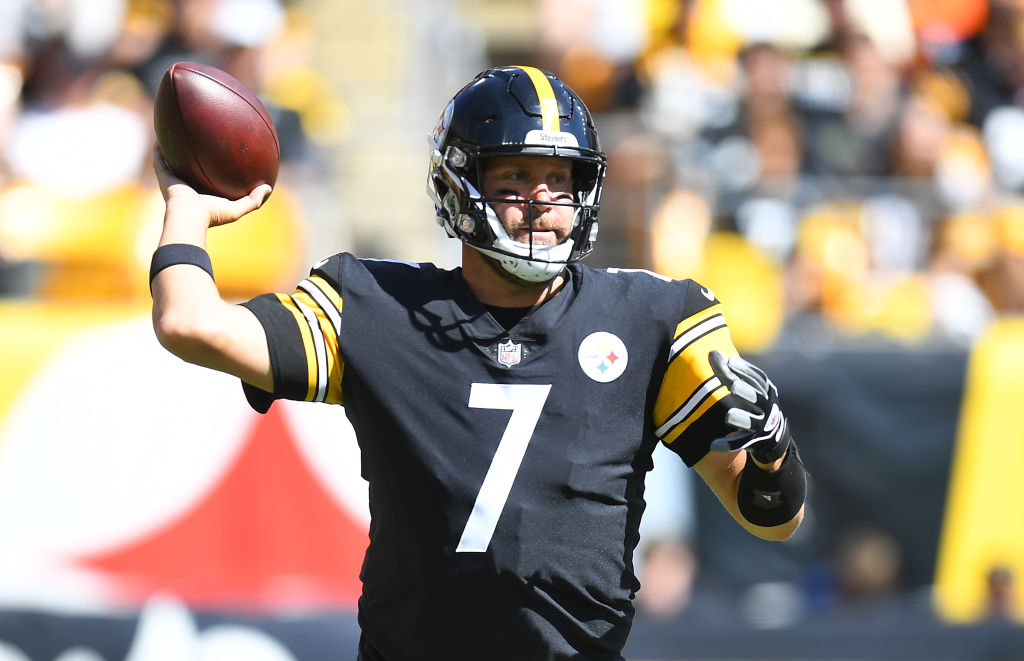
The dream 2004 quarterback draft class saw Eli Manning, Philip Rivers and Ben Roethlisberger all go in the first round.
Big Ben was taken 11th overall by the Pittsburgh Steelers, who were coming off a rare losing and non-playoff season.
The plan was for Roethlisberger to sit behind Charlie Batch and Tommy Maddox for the 2004 season. But Batch was injured in preseason play, and Maddox was injured in a blowout Week 2 loss to the Baltimore Ravens.
That left Bill Cowher no choice but to start Roethlisberger, but No. 7 was more than NFL-ready.
All he did was win all 13 of his regular season starts to pace Pittsburgh to a league-best 15-and-1 record. He completed an excellent 66.4 of his pass attempts and had 17 touchdowns against 11 picks.
Roethlisberger also racked up five game-winning drives, a sign of the super-clutch play that would largely define his career. The Steelers squeaked past the New York Jets in the Divisional Round, but they ultimately fell to the dynastic Patriots at home in the AFC title game.
But Ben’s rookie season, which culminated in an Offensive Rookie of the Year award, was nothing short of legendary. Not to mention he was able to build off it and help Pittsburgh to a Super Bowl 40 championship in his sophomore year.
Worst: Ryan Leaf (1998)
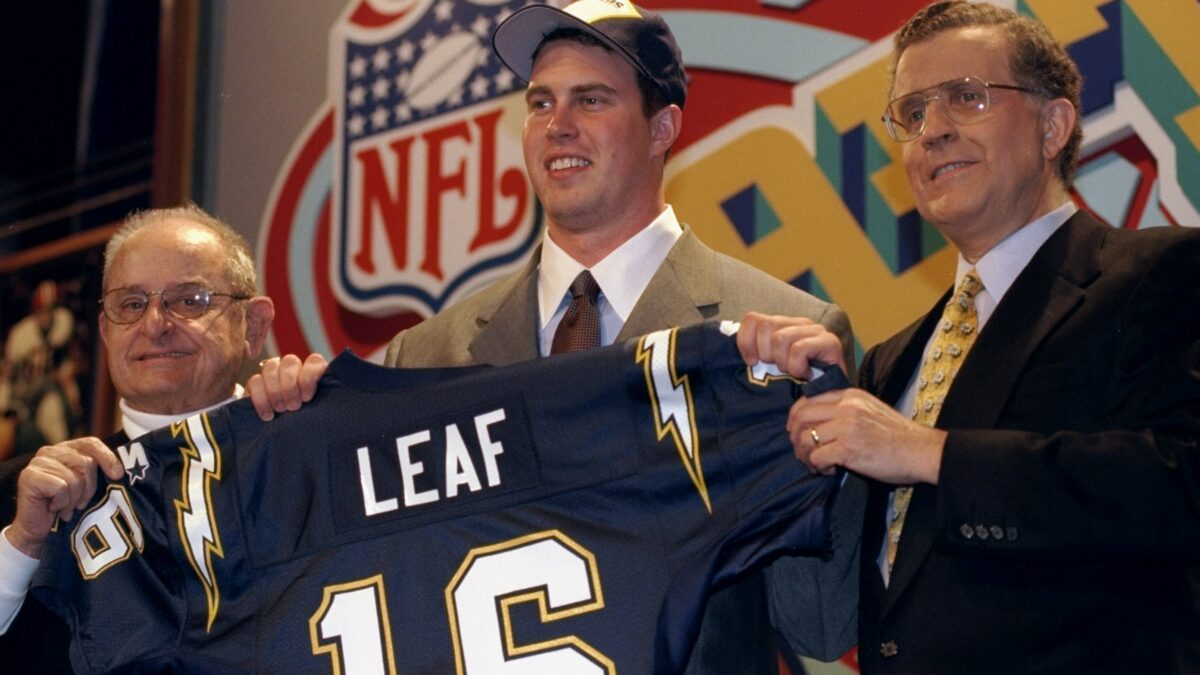
Peyton Manning and Ryan Leaf were viewed as two franchise-changing quarterbacks. The Indianapolis Colts wisely selected Manning with the top selection. We’re pretty sure you’ve heard of him.
The Chargers moved up via trade with the Arizona Cardinals and took Leaf with the No. 2 selection. But his career was a mega disappointment from the get-go.
Leaf became renowned for his off-the-field partying and not taking his job seriously, even playing golf instead of studying film. Leaf also made headlines when he was filmed screaming at a Chargers’ reporter in the locker room.
And he was awful on the football field. Leaf lost six of nine starts and completed just 45.3 percent of his passes for 1,289 yards…two touchdowns and 15 picks. Yeah, it was gross football.
Sadly, it was foreshadowing of Leaf’s career. A shoulder injury forced him to miss his entire sophomore campaign, and he never found his rhythm and was done in the NFL after three playing seasons.























